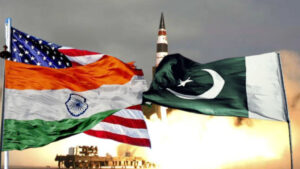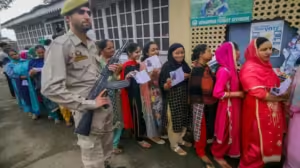The Missing Piece: How the Exclusion of Palestine Doomed the Middle East Normalization Plan
The recent infiltration by Hamas, i.e., “Al-Aqsa Flood” into Israel and the increase in escalation of conflict came in the wake of normalization efforts by Middle Eastern countries, especially Saudi Arabia’s recognition of Israel, which was drummed in the international media. The Middle Eastern leadership’s tendency to exhibit an ostrich-like attitude concerning the Palestine situation, wherein they hope it will either fade into oblivion or be entirely disregarded, stands as one of the most profound disappointments they could encounter. Now, the consequences of the ostrich effect have sprung up, which could potentially destabilize the region once again.
Several factors contributed to the recent meltdown in Israel and occupied Palestinian territories. These factors became a boiling point and increased frustration with the occupied territories and besieged Gaza.
Trump’s Peace Plan

Trump’s peace plan, which was proposed on 28th January 2020, was supposed to be the “deal of the century” to resolve the Palestinian-Israeli conflict once and for all. This proposed plan, however, was rejected by the Palestinian authority ruling the West Bank. The plan proposed almost 30% of more Palestinian land annexed by Israel including the fertile Jordan valley, which is a lifeline for many Palestinian farmers. Annexation of Jordan Valley also means effectively cutting West Bank off from the rest of the world. In the plan, there will be a series of Palestinian enclaves surrounded by much larger Israeli enclaves. This means that already restricted Palestinian movement will further be restricted with more Israeli checkpoints and many Palestinian enclaves will be disconnected from each other. The plan also proposed complete demilitarization of the Palestinian state which is unrealistic at best.
This proposed plan further reiterated the Palestinian point that Israel nor any Western state is serious about solving Palestinian issues. Former U.S. President Donald J. Trump also confirmed that Benjamin Netanyahu never wanted peace with the Palestinians. The West consistently overlooks the concerns of Palestinians and anticipates that Palestinians will not respond, while Palestinians should, on the other hand, tend to prioritize discussions about peace over asserting their demand for an independent state. This demand from the Palestinians for Israelis seems unrealistic and illogical.
Turning a Blind Eye to Outstanding Issues
The normalization wave spread through the Middle East, which dates back to 2020 when several Middle Eastern states normalized the relations and recognized Israel. Abraham accords, which were initially signed by UAE and Bahrain, and later by Sudan and Morocco started a normalization wave that the analysts say would eventually be completed with Saudi Arabia normalizing ties with Israel. This would encourage other Muslim states to recognize Israel and be treated as legitimate players in the Middle East.
Middle Eastern states often overlook the fundamental issue that their initial refusal to recognize Israel stemmed from the occupation of the Palestinian state. If the core of normalization does not address the statehood of Palestine, normalization efforts are likely to fail, leaving the Middle East in conflict again.
Saudi Crown Prince Interview
Less than a month ago, the Israeli tourism minister was on a 2-day visit to Riyadh to attend the UN World Tourism Organization event. The Israeli communication minister was recently in Riyadh to attend yet another conference. The final nail in the coffin might be Crown Prince of Saudi Arabia Muhammad Bin Salman’s interview with the American News Channel, where he acknowledged talks with Israel, saying “good negotiations” are underway. Although Palestinian rights are part of negotiations, it’s difficult to say that the Palestinian state is on the table as Saudi Arabia does not aim to change the status quo in the Middle East nor does it seem from the interview that there were any talks about separate Palestinian state.
This might be seen as a source of betrayal among Palestinians, as it implies that the Palestinian cause has been abandoned. The guarantee of Palestinian rights does not necessarily translate into the establishment of a Palestinian state where Palestinians can exercise their freedoms and make independent decisions.
On the other hand, Iran has always opposed the normalization plan, stating that Saudi-Israel normalization would be “detrimental” to the stability of the region. Also stated that a show of restraint “can’t be one-sided” meaning that Israel can’t continue to escalate the conflict by bombing Gaza while Palestinian fighters and allies show restraint.
It’s important to emphasize that this assault on Israel is not a result of unprovoked actions; instead, it can be viewed as a reaction to years of targeted killings of Palestinians and the occupation of their land. United Nations General Assembly Resolution 37/43 clearly states that it recognizes the “legitimacy of the struggle of peoples for independence, territorial integrity, national unity and liberation from colonial and foreign domination and foreign occupation by all available means, including armed struggle.”
The recent commencement of violence is simply a continuation of the reaction of Palestinians against Israel’s occupation of Palestinian territories. The ongoing conflict is likely to persist unless a fair resolution to the Palestinian issue emerges, though such a resolution appears uncertain in the near future. This conflict has the potential to escalate beyond Israeli borders, especially if Israel were to initiate a ground invasion of Gaza, with Iran threatening to open additional fronts.
Ultimately, this conflict is likely to persist between Israel and Hamas or potentially other entities until a just settlement is provided for the people of Palestine. As of yet, the people of Gaza face severe shortages of necessities like water and electricity, let alone the right to self-determination and statehood. Palestine is the missing piece of the normalization talks that will dictate the future of the Middle East. Without Palestine, these talks stand on shaky ground, prone to falter.

Shamil Abdullah Saleh

The Duality of U.S. Policy in South Asia
The recent U.S. sanctions on Pakistan’s missile program, coupled with unsubstantiated claims of its targeting the U.S., reflect a broader geopolitical strategy aimed at undermining Pakistan’s strategic autonomy while selectively favoring India’s missile advancements, thereby exacerbating regional power imbalances in South Asia.

The BRICS Challenge: Can 100% Tariffs Save the U.S. Dollar?
Trump’s 100% tariff threat on BRICS may backfire, accelerating de-dollarization, sparking trade wars, and undermining U.S. economic dominance globally.

Threat Towards Nuclear Safety and Security Amid Global Tensions
Global nuclear safety is increasingly at risk amid rising international tensions. While India and Pakistan exhibit restraint with nuclear infrastructure agreements, superpowers like the U.S. and Russia escalate conflicts by targeting strategic facilities. This disparity emphasizes the need for global nuclear safeguards to prevent potential catastrophes from intentional or accidental nuclear incidents.

The SCO Summit in Pakistan: Opportunity or Challenge?
The upcoming SCO Summit presents Pakistan with a crucial opportunity to enhance its global standing, but also significant challenges. Missteps in handling political instability or countering India’s narrative could backfire. To seize this moment, Pakistan must skillfully manage relations with key players like China, Iran, and Russia while diplomatically addressing India’s criticisms. A well-crafted, strategic approach is essential to turning these challenges into long-term foreign policy gains for the country.

Indian Occupied Jammu and Kashmir Elections 2024: A Mere Façade?
The article argues that 2024 elections in Indian Illegally Occupied Jammu and Kashmir are seen as a façade, aimed at diverting the region’s freedom movement amid ongoing human rights violations and central government control following the abrogation of Articles 370 and 35A.

Industry, Innovation and Infrastructure: Building A Foundationally Sound Pakistan
This article investigates Pakistan’s position within Sustainable Development Goal (SDG) 9, “Industry, innovation and infrastructure.” It explores Pakistan’s in developing a robust industrial base, fostering innovation and establishing a sustainable infrastructure network. Through key government initiatives like “Digital Pakistan” and the National Transport Policy, Pakistan’s role maintaining its commitment to SDG 9 is highlighted. Additionally, it explores the potential challenges in addition to their possible solutions that Pakistan face in its journey to Goal 9.

